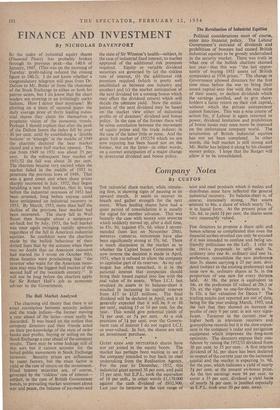Company Notes
By CUSTOS
THE industrial share market, while remain- ing firm, is showing signs of pausing in its upward march. It needs to recover its breath and gather strength for the next move. When leading shares have had a quiet period of consolidation it is usually the signal for another advance. This was iecently the case with MARKS AND SPENCER which suddenly moved up, after a dull time, to 85s. 9d. (against 67s. 6d. when I recom- mended them last on November 20th). IMPERIAL CHEMICAL INDUSTRIES have also been significantly strong at 57s. 6d. There. is much discussion in the market as to whether the Capital Issues Committee will now reverse the decision it made in April, 1951, when it refused to allow the company to capitalise part of its reserves. As my col- league has often remarked, it is in the national interest that companies should bring their issued capital into line with the ,real value of its assets. When I.C.I. last revalued its assets in its balance-sheet it resulted in increasing its capital reserves from £17 to £125 millions. The final dividend will be declared in April, and it is generally expected that it will be 9 or 10 per cent., making 15 or 16 per cetit, for the year. This would give potential yields of 51 per cent. or 51 per cent. At a risk premium of 11 per cent, over the Govern- ment rate of interest I do not regard I.C.I. as over-valued. In fact, the shares are still an investment purchase. • • • GUEST KEEN AND NETTLEFOLD shares have not yet joined in the equity boom. The market has perhaps been waiting to see if the company intended to buy back its steel undertaking from the Realisation Agency. For the year to December, 1952, this industrial giant earned 38 per cent. and paid 15 per cent. but E.P.L. took the equivalent of 18 per c,eflt., in other words £.1,170,000 against the cash dividend of £932,900. Last year its turnover in the vast range of wire and steel products which it makes and distributes must have reflected the general industrial recovery. Its balance-sheet is, of course, immensely strong. Net assets amount to 86s. a share of which nearly 74s. is in liquid form. At the present price of 52s. 6d. to yield 51 per cent, the shares seem very reasonably valued.
FOR directors to propose a share split and bonus scheme so complicated that even the financial scribes revolted can only be excused if it was intended to confuse and befog un- friendly politicians on the Left. I refer to the DEccA proposals to split each 5s. ordinary into one 4s. ordinary and one Is. preference, consolidate the new preference into 5s. shares carrying a 25 per cent. divi- dend (subject to the existing preference) and issue new 4s. ordinary shares at 5s. in the proportion of one new for every thirteen held. At 38s. the price is equivalent to 34s. ex the preference (if valued at 20s.) or 32s. ex the right to onc-for-thirteen at 5s. Is 32s. a fair valuation for Decca ? The trading results just reported are out of date, being for the year ending March, 1953, and the fact that they showed an increase ia. profits of only 9 per cent. is not very signi- ficant. Turnover in the current year is higher both in television receivers and gramophone records but it is the slow expan- sion'in the company's radar and navigation equipment which impresses the long-term optimists. The directors express their con- fidence by raising the 1952/53 dividend from 30 per cent. to 35 per cent. A first interim dividend of 3d. per share has been declared in respect of the current year on the increased capital and the market is expecting is. 9d. for the year, which indicates a yield of nearly 5i per cent, at the present ex-bonus price. As the last earnings were 94 per cent, to cover a 35 per cent. dividend a yield basis of nearly 54 per cent. is justified especially as E.P.L. took over 20 per cent. away.


































 Previous page
Previous page